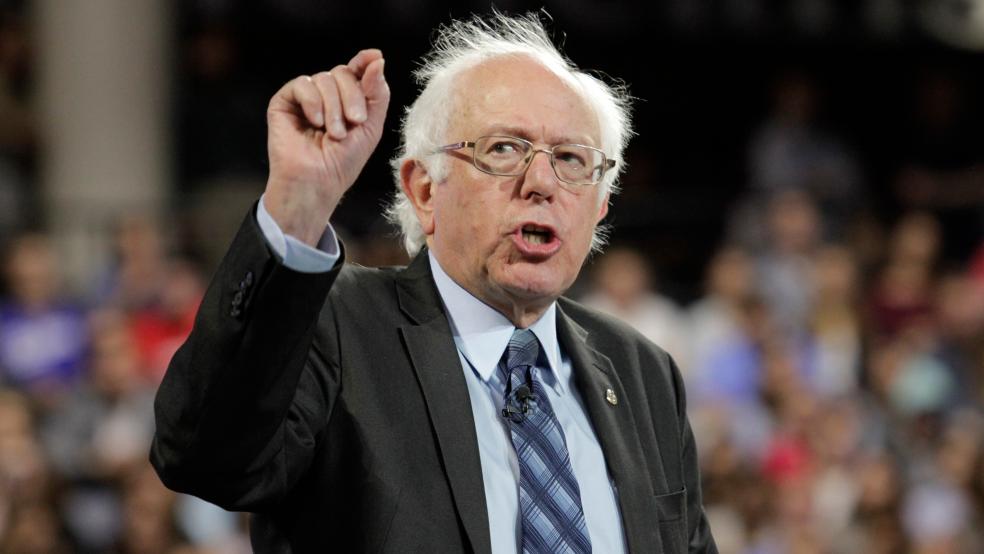Federal Reserve Chair Janet Yellen has been taking heavy flak recently from critics on the right who are determined to rein in the powers of the independent board and open its policies and operations to much greater outside scrutiny.
But the Fed has been drawing fire from the left as well, including from Sens. Elizabeth Warren (D-MA) and Sherrod Brown (D-OH). Sen. Bernie Sanders of Vermont has predicated his campaign against Hillary Clinton in part on his utter disdain of Wall Street and what he perceives as the Federal Reserve’s coziness with the top executives of major banks and financial institutions that had to be bailed out by the Fed and the Treasury Department during the 2008 financial crisis.
Related: The Fed Just Raised Rates. Here’s What It Means for Your Money
Sanders penned an op-ed piece in The New York Times on Wednesday rivaling Republicans for advocating some of the most draconian changes to an institution that has long prided its independence from political influence.
Sanders notes that almost every one of the banks is bigger today than they were at the time of the crisis, and that “If any were to fail again, taxpayers could be on the hook for another bailout, perhaps a larger one this time.”
“To rein in Wall Street, we should begin by reforming the Federal Reserve, which oversees financial institutions and which uses monetary policy to maintain price stability and full employment,” Sanders wrote. “Unfortunately, an institution that was created to serve all Americans has been hijacked by the very bankers it regulates.”
Sanders argues that the Federal Reserve’s announcement Dec. 17 ending a seven-year policy of near-zero interest rates by raising its benchmark rate was “the latest example of the rigged economic system. “Big bankers and their supporters in Congress have been telling us for years that runaway inflation is just around the corner” and must be prevented through a rise in interest rates, Sanders said. “They have been dead wrong each time.”
Related: How Banks Win and You Lose from Fed Rate Hike
He insisted that raising interest rates now will be a serious blow to small businesses that need loans to expand their operations, which would also help average Americans who need more jobs and higher wages. As a rule, he added, the Fed should not raise interest rates until unemployment is lower than 4 percent.
“The sad reality is that the Federal Reserve doesn’t regulate Wall Street,” Sanders wrote. “Wall Street regulates the Fed. It’s time to make banking work for the productive economy and for all Americans, not just a handful of wealthy speculators.”
Liberal Democrats and conservative Republicans long have differed over the Fed’s near-zero interest monetary policy aimed at encouraging the long-term economic recovery. But Sanders’s op-ed today clearly delineated where the left and the right see eye to eye on the Fed’s operations and the remarkable overlap in their prescriptions for change.
Here are a few of Sanders’s most sweeping proposals:
- Fundamentally restructure the Fed’s governance system to eliminate conflicts of interests. While the president appoints the seven members of the central bank’s board, subject to the approval of the Senate, the nine-member boards of the 12 regional Federal Reserve banks are selected by member banks and the Board of Governors.
- Sanders insists this procedure is rife with the potential for conflicts of interest and is tantamount to letting the fox guard the hen house. Next year, for example, four of the 12 presidents at the regional Federal Reserve banks will be former executives from one firm, Goldman Sachs. Sanders says regional Fed board members should be nominated by the president and confirmed by the Senate. Moreover, banking industry executives must no longer be allowed to serve on the Fed’s regional boards.
- Increase transparency in the Fed’s operations. Sanders says far too much of the Fed’s business is conducted in secret. He is calling for the public release of full and un-redacted transcripts of the Federal Open Market Committee, the chief policy-making group, within six months, instead of the customary five years. “If we had made this reform in 2004, the American people would have learned about the housing bubble well in advance of the financial crisis,” Sanders wrote. He also favors requiring a full, annual audit of the Fed’s operations by the Government Accountability Office.
- Require the Fed to pressure regulated banks on the types of loans they make. Sanders said it should be the Fed’s duty to make sure that financial institutions are investing in “the productive economy” by providing affordable loans to small businesses and consumers with the aim of creating good jobs. This can be achieved in part by discontinuing a Fed policy begun in 2008 to pay financial interest on excess reserved kept at the central bank – reserves that have reached $2.4 trillion. “Instead of paying banks interest on these reserves, the Fed should charge them a fee that would be used to provide direct loans to small businesses,” Sanders wrote.
- Reinstate the Glass-Steagall Act and break up the too big to fail financial institutions that threaten the economy. Sanders writes that commercial banks must be discouraged from “gambling with the deposits of the American people.” This could be done in part by reinstating Glass-Steagall, which for decades required a firewall of sorts between commercial banking and securities investment.





